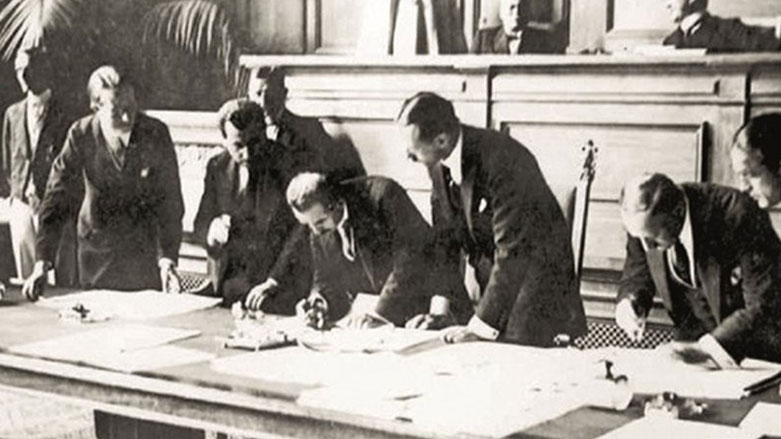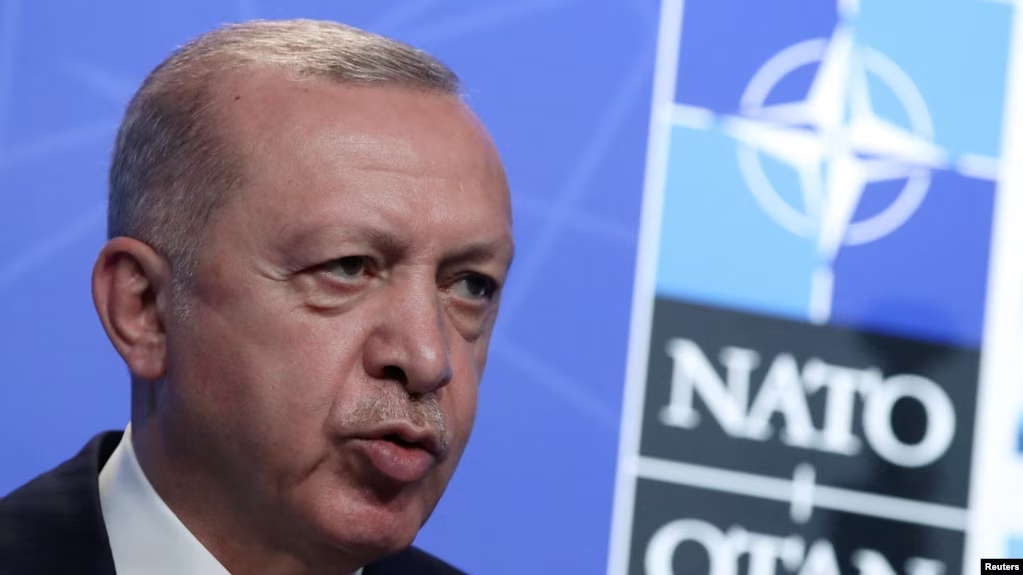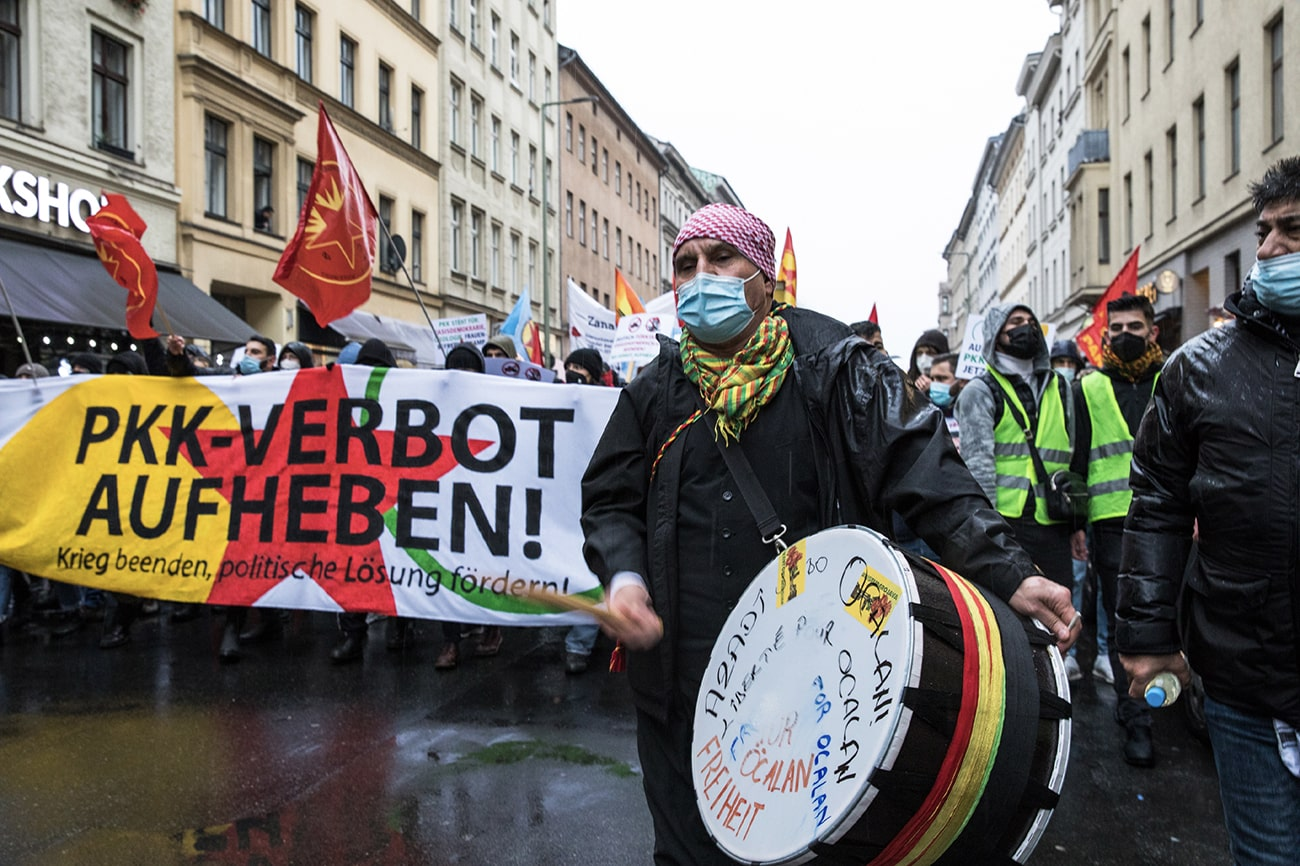By signing the Treaty of Lausanne in 1923 Turkey destroyed all hope for the Kurds of the right to self-determination and the establishment of the independent state they dreamed of. Foreign powers, not least Turkey and NATO, have used the Kurds as pawns throughout history, in their own interests and whenever it seemed politically favorable, right from the signing of the Lausanne Treaty in 1923 to Sweden’s application for NATO membership in 2023. The Kurds are still not recognized, they are the people who are always sacrificed for the benefit of geopolitical matters.
Provisions that were relevant to Kurdish statehood were included in the Treaty of Sèvres, signed on 10 August 1920 in the aftermath of World War I and the dissolution of the Ottoman Empire. Under the terms of the Treaty of Sèvres, the Ottoman Empire ceded significant territories, including areas with a predominantly Kurdish population, to various Allied Powers. The treaty of Sèvres recognised the right of self-determination for the Kurdish people and stipulated the possibility of establishing an independent Kurdish state in the region known as Kurdistan. This proposed Kurdish state would have included parts of what are now Turkey, Iraq, Iran and Syria.
The Kurdish plight: A century of silence and suppression

However, its implementation faced severe challenges. The Turkish War of Independence, led by Mustafa Kemal Atatürk, emerged as a response to the terms of the treaty, resulting in a new Turkish nationalist movement. In 1923, the Treaty of Lausanne (signed on 24 July) superseded the Treaty of Sèvres, and the Republic of Turkey was established. Its primary focus was on defining the borders and sovereignty of modern-day Turkey and addressing the status of various minority populations within the republic. The Turkish nationalist movement had rejected the territorial losses and provisions of the Treaty of Sèvres, and the new borders were renegotiated through the Treaty of Lausanne.
The new borders did not grant the Kurds an independent state. Instead, Kurdish territories were divided among several nations, leading to the Kurdish population becoming minorities in those respective countries. The Kurds had no representation and were completely silenced in the process. Throughout the implementation “the systematic policy in the negotiation process of denial, assimilation, and cultural genocide against the Kurdish people was initiated, and Kurdistan was transformed into an international colony” which led to a 100-year-long political, cultural, and social darkness for the Kurdish people. The Treaty of Lausanne contributed to the initial transfer of the Kurdish cause from anonymity to the forefront, as the allied powers had interests in exploiting the Kurds’ resources and territories, which in turn led the Kurds later from the forefront to oblivion.
By signing the Treaty of Lausanne in 1923 Turkey destroyed all hope for the Kurds of the right to self-determination and the establishment of an independent state, as they dreamed of. Foreign powers, not least Turkey and NATO, have used the Kurds as pawns throughout history, in their own interests and whenever it seemed politically favorable, right from the signing of the Lausanne Treaty in 1923 to Sweden’s application for NATO membership in 2023. The Kurds are still not recognized, they are the people who are always sacrificed for the benefit of geopolitical matters.
Erdoğan’s manipulation of NATO and the EU

A hundred years after the Treaty of Lausanne entered into force, Kurdistan is still occupied, but now by colonizers who are better organized, more cunning and equipped with an enormous arsenal of weapons. Erdoğan knows very well that the West in many ways depends on Turkey, that it is unique in the geopolitical landscape. He knows that the Turkish army is indispensable in terms of strength and military power. He exploits this for all it is worth and converts the conditions for support for NATO into political demands. So, what happens is that the NATO alliance still maintains a grip on the Kurds through its member state Turkey. Erdoğan plays on all strings to make NATO, the EU and others involved dance to his will. And it seems to be working. Although Secretary-General Jens Stoltenberg and most European political leaders are aware of Erdoğan’s game, and in many ways tired of it, they will still try as far as possible to meet his conditions, even if in this context it comes at the expense of the Kurds, a stateless people who number between 30 and 45 million worldwide.
But eventually, out of the darkness into which the Treaty of Lausanne threw the Kurds, an invincible resistance grew up which so far no one has been able to put down. Erdoğan, with tacit support from NATO, has during his rule used all conceivable means – not least military – to put down the resistance and crush the Kurds. He uses the fight against terror as a pretext to bring down the PKK [Kurdistan Workers’ Party], not only within Turkey’s borders, but he also violates the sovereignty of other states through his acts of war, something the Kurds have experienced for many years in Northern Iraq and Northeast Syria. In addition, Erdoğan uses diplomatic means to target Kurds in the diaspora; in Germany, the UK and France, a fact that became crystal clear during in the negotiations relating to Sweden’s NATO membership.
Undoubtedly, the same policy of denial and repression that was signed by the Allied Powers and Turkey in 1923 continues – and to an even greater extent than then. It has turned into daily military attacks on Kurdish targets and attacks with chemical weapons, and the goal is clearly the eradication through military attacks of everything that resembles Kurdish autonomy and self-government as we see it in the mountains of Kurdistan, in Rojava, Shengal [Sinjar], and even the refugee camp Maxmur [Makhmour] – all cradles of democratic autonomy.
Although the PKK is used as the excuse for armed attacks, civilians, organizations, political parties, lawyers, academics and artists are also affected. Tens of thousands have been imprisoned, tens of thousands have been killed, and Kurds in general are persecuted and targeted wherever they are. It is ethnic, cultural, social and political genocide that is being carried out by the use of all means possible.
But the darkness left by the Treaty of Lausanne in 1923 did not last. The Kurdish resistance was too strong. Since the end of the 1970s, the PKK, headed by its leader Abdullah Öcalan and the Kurdish liberation movement, have fought back militarily, but perhaps just as much through an awareness-raising process in which Kurdish identity, language and culture gradually became stronger. Due to the strength of the military struggle waged by the PKK and the power of the awareness process, the Kurds can no longer be silenced, either through assimilation or military operations.
The global support for the Kurdish cause: A ray of hope

But despite their impressive resistance the Kurds as a people are still not internationally recognized. For as long as geopolitical interests and Turkey’s neo-Ottoman aspirations receive support from the major international organizations and powers such as NATO and the United States as well as from the EU and the Council of Europe, it will be extremely difficult for the Kurds to step forward in the arena to be heard on their own behalf.
But when everything looks at its darkest, it is easy to forget all the people, organizations and parties around the world who work daily to support the Kurdish cause, who tirelessly and without regard for their own gain or security stand on the barricades for them.
It is important to keep in mind that there is hope and there is light in the tunnel ahead – this certainty we must hold dear, and it is the one that will ultimately bring home the victory – whether it comes today or tomorrow.
Kariane Westrheim is Professor of Educational Science at the University of Bergen, Norway. Since 2004, Westrheim has chaired the EU Turkey Civic Commission (EUTCC) which among others organise the Annual International Conference on EU Turkey and the Kurds in the European Parliament, Brussels.








Leave A Comment